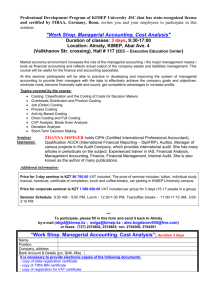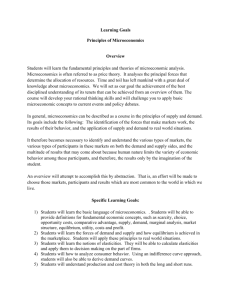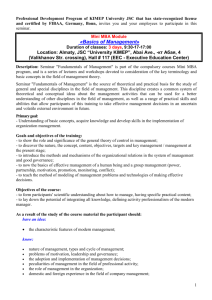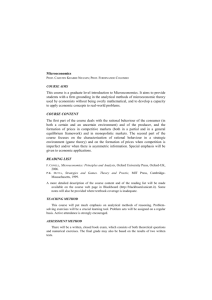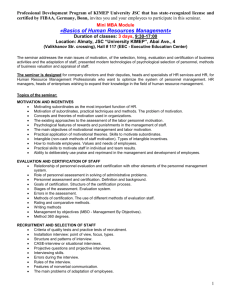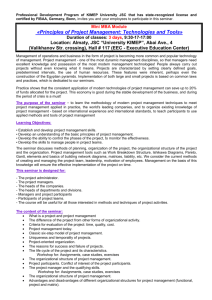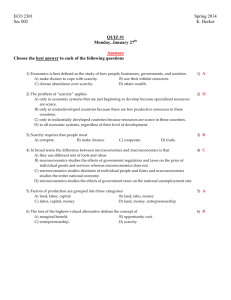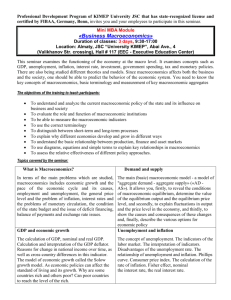Business Microeconomics
advertisement
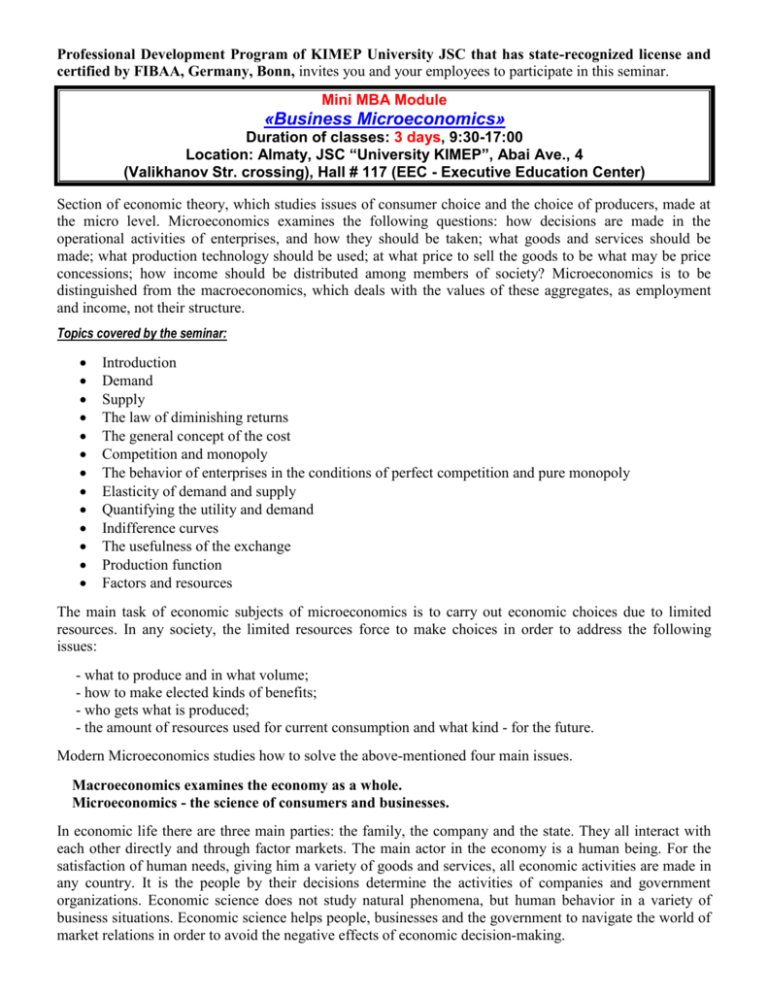
Professional Development Program of KIMEP University JSC that has state-recognized license and certified by FIBAA, Germany, Bonn, invites you and your employees to participate in this seminar. Mini MBA Module «Business Microeconomics» Duration of classes: 3 days, 9:30-17:00 Location: Almaty, JSC “University KIMEP”, Abai Ave., 4 (Valikhanov Str. crossing), Hall # 117 (EEC - Executive Education Center) Section of economic theory, which studies issues of consumer choice and the choice of producers, made at the micro level. Microeconomics examines the following questions: how decisions are made in the operational activities of enterprises, and how they should be taken; what goods and services should be made; what production technology should be used; at what price to sell the goods to be what may be price concessions; how income should be distributed among members of society? Microeconomics is to be distinguished from the macroeconomics, which deals with the values of these aggregates, as employment and income, not their structure. Topics covered by the seminar: Introduction Demand Supply The law of diminishing returns The general concept of the cost Competition and monopoly The behavior of enterprises in the conditions of perfect competition and pure monopoly Elasticity of demand and supply Quantifying the utility and demand Indifference curves The usefulness of the exchange Production function Factors and resources The main task of economic subjects of microeconomics is to carry out economic choices due to limited resources. In any society, the limited resources force to make choices in order to address the following issues: - what to produce and in what volume; - how to make elected kinds of benefits; - who gets what is produced; - the amount of resources used for current consumption and what kind - for the future. Modern Microeconomics studies how to solve the above-mentioned four main issues. Macroeconomics examines the economy as a whole. Microeconomics - the science of consumers and businesses. In economic life there are three main parties: the family, the company and the state. They all interact with each other directly and through factor markets. The main actor in the economy is a human being. For the satisfaction of human needs, giving him a variety of goods and services, all economic activities are made in any country. It is the people by their decisions determine the activities of companies and government organizations. Economic science does not study natural phenomena, but human behavior in a variety of business situations. Economic science helps people, businesses and the government to navigate the world of market relations in order to avoid the negative effects of economic decision-making. In spite of the existing difference of issues at the micro- and macro-economic, it should be taken into account that these two components do not exist by themselves, but are closely linked. The significant gap between the two sciences existed at the dawn of the emergence of macroeconomics and gradually more and more is reduced. In fact, all modern macroeconomic concepts have microeconomic rationale, i.e. they are based on certain behavioral microeconomic models, the results of which are aggregated and then studied at the macro level. Methods of training: Training is conducted in a mode of intensive interaction and leading participants. For efficient assimilation of theoretical material by participants in the program a large number of discussions and illustrations are included. Seminar instructor: Dr. Sholpan Gaisina is an Associate Dean for undergraduate programs at BCB and a faculty member, teaching Business Macroeconomics, Business Microeconomics, Financial Institution Management, and Business Communications. She graduated from Nagoya University in Japan in 2011 with a degree “Doctor in Economics”; additionally, she had got a Ph.D. degree from Kazakh Research Institute of Agriculture in 1999. She is a fellow of a number of very prestigious foundations as Alexander von Humboldt Foundation (Germany), Fulbright Foundation (USA), Japanese Society for Promotion of Science, The Netherlands Institute for Advanced Studies, DAAD (Germany). She has an experience of teaching at Averett University in Danville, Virginia, USA (2013-2014) and at Stockholm School of Economics (Riga branch) (2010). She has worked as an international trainer, having a certificate from the International City/County Management Association (ICMA), USA. She has conducted trainings on Leadership, Local Budget Process, Public Hearings, and Financial Management in different regions of Kazakhstan. She works intensively as a researcher. She has published 2 books, 24 papers and 26 conference contributions to conferences. She has a good experience working in the research team projects both as a supervisor and as a participant. Her academic interests are mainly on Financial Institutions and Services in Rural Areas in Transition Economies, Borrowing and Saving Behavior of Rural Population, Rural Credit Cooperation. Additional information: Price for 3-day seminar is KZT 86 700.00 VAT included. The price of seminar includes: tuition, individual study manual, handouts, certificate of completion, lunch and coffee-breaks, car parking in KIMEP University campus. Price for corporate seminar is KZT 1 080 000.00 VAT included per group for 3 days (15-17 people in a group) Seminar Schedule: 9:30 AM - 5:00 PM, Lunch - 12:30-1:30 PM, Tea/coffee breaks - 11:00-11:15 AM, 3:00-3:15 PM *** To participate, please fill in this form and send it back to Almaty by e-mail (abgd@kimep.kz ; solga@kimep.kz ; alex.bogdanov555@live.com) or faxes: (727) 2374802, 2374803; тел. 2704300, 2704301 Mini MBA Module «Business Microeconomics», duration 3 days Name Position Company, address Bank Account & Details (р/с, БИН, ИИК, Кбе) It is necessary to provide electronic copies of the following documents: - copy of state registration certificate - copy of TRN/ BIN certificate - copy of registration for VAT certificate Fax PHH of the company Tel E-mail Tuition payment is made before the beginning of the seminar. Please, send a copy of the payment order to the above mentioned fax. Alexander Bogdanov, Manager, Professional Development Program, Joint-Stock Company “KIMEP University”

